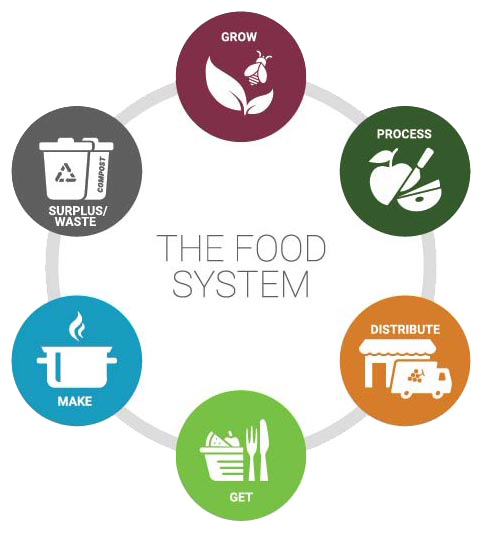This resource shows the range of policy options for communities seeking to increase access to healthy food and gives examples of local laws and comprehensive plans that promote access to healthy food at various points along the food system.
Introduction
To help local policymakers, leaders, advocates, researchers, and others understand policy options for communities seeking to increase access to healthy food, the Healthy Food Policy Project (HFPP) developed a framework to show how local law—including legislation, administrative regulations, and executive orders—can promote access to healthy food at various points along the food system. This framework also highlights planning documents such as comprehensive plans and sustainability plans which are often used to guide development and evaluation of local laws and other efforts.
The availability and accessibility of healthy food is largely determined by activities at different stages of the food system which are influenced and shaped by local law such as ordinances, regulations, executive orders, and planning documents. Planning documents may include comprehensive plans, master plans, land use plans, and zoning maps, among others. Because definitions of the food system vary, HFPP developed working definitions of six key food system components (grow, process, distribute, get, make, and surplus/waste management). This framework provides examples of specific laws and policies that fall into each of these categories, acknowledging that many fall within more than one.
Executive Orders at the Local Level
While it may be less common, most mayors can issue executive orders just like state governors or the US president. At the local level, executive orders are “official directives or commands from the Mayor to agencies in the executive branch. These orders generally concern the implementation or enforcement of rules, policies and procedures” and have the force of law.1 However, not all mayors have the power to issue executive orders. Authority depends on state law, as the federal constitution does not mention local government or its powers.2 States may take either a “Home Rule” approach—where municipal governments have authority to legislate unless specifically prohibited by state law—or a “Dillon’s Rule” approach—where municipal governments may not legislate unless specifically allowed by state law. Most states blend the two, choosing a different approach for different legal areas or functions.
Mayors’ authority to issue executive orders also depends on the structure of their particular town or city. For example, before 1998, the mayor of Oakland, California, was simply a member of the city council and had no administrative or executive powers. Since the passage of an amendment removing the mayor from the council and granting administrative and executive powers, the mayor is able to issue executive orders, as long as they do not impinge on the authority reserved for the legislative branch of local government (the city council).
The UN Food and Agriculture Organization (FAO) defines food systems as “encompass[ing] the entire range of actors and their interlinked value-adding activities involved in the production, aggregation, processing, distribution, consumption and disposal of food products that originate from agriculture, forestry or fisheries, and parts of the broader economic, societal and natural environments in which they are embedded."
— Food and Agriculture Organization of the United Nations, Sustainable Food Systems Concept and Framework (2018)
The laws and policies in this document are organized by legal strategy, using the following categories:
- Creates an educational campaign; describes goals and future actions in a comprehensive plan, master plan, or land use plan; provides information or teaches skills.
- Creates a fund or allows a community to access an existing state or federal funding stream.
- Requires something or sets a standard.
- Prohibits or discourages something.
- Creates an incentive for a practice or behavior—such as a tax break or discount on a permit or licensing fee, provision of favorable marketing, or other inducement.
- Expressly allows something in a way that supports or promotes access to healthy food.
- Creates an exemption or deregulates something in a way that supports or promotes access to healthy food.
This framework captures many but not all types of local policies that may increase access to healthy food. For example, it does not include operating practices for licensing, inspection, and permitting departments; food procurement goals; and municipal program guidelines and procedures. Although these less formal policies can be important tools to promote healthy food access, they are often more difficult to identify and evaluate.
For each intersection of food system stage and legal strategy we provide policy examples, including endnotes linking to relevant local laws from real cities and towns. These examples are illustrative and not exhaustive, and some may repeat if they fall into more than one category.
A particular law or policy that works well in one community may not be a good fit for other communities. To be most effective and minimize negative unintended consequences, law and policy tools must be tailored to the community they are meant to serve after seeking and including feedback and input from the community. For more information about policy drafting considerations, see our Policy Drafting Companion Guide. For more information about how to authentically engage residents in the policymaking process, see our resource Food Access Policy Change Through Authentic Resident Engagement.
Acknowledgements
This resource was developed by the Healthy Food Policy Project team, including the Public Health Law Center, the Center for Agriculture and Food Systems, and the Rudd Center for Food Policy and Health. We also thank Amanda Karls, J.D. for reviewing and providing feedback on this resource.
Suggested Citation
Healthy Food Pol’y Project, Local Policy to Promote Healthy Food Access: A Food Systems Framework (2023), https://healthyfoodpolicyproject.org/wp-content/uploads/Food-Systems-Framework.pdf.




